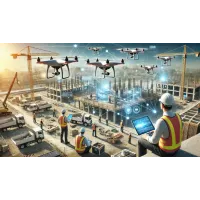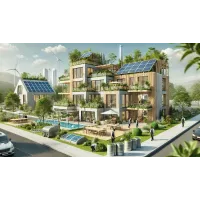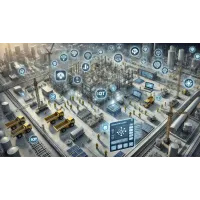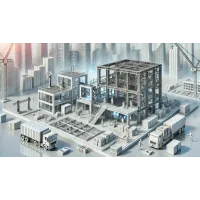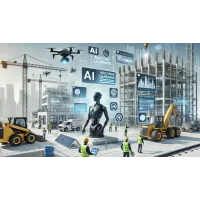Smart Buildings and Automated Systems
Smart buildings and Automated systems Energy savings form the basis of modern construction trends in terms of security and comfort. These buildings are automatically managed by lighting, heating, security and other systems through integrated technologies. The main purpose of intelligent buildings is to create an environment adapted to more comfortable, secure and users` daily needs for residents while saving energy. These buildings are widely used not only for habitats, but also in the office, shopping malls and industries.
Application of smart systems
Smart buildings allow the application of automated systems in various fields. These systems simplify the lives of users in terms of lighting and security.
Lighting and heating: Lighting and heating systems in smart buildings are automatically managed and regulated in accordance with the environment. For example, lighting sensors open and turn off the light on the time of the day or the presence of people in the room. This prevents energy waste and minimizes electricity costs. At the same time, heating and cooling systems are also automatically regulated by following the range of parameters and the number of people in the room, which increases the comfort and saves energy.
Security systems: Intelligent buildings and cameras are constant control of the environment installed for security. Through these systems, any dangerous situations (such as the entry of moving objects in a certain zone) are automatically detected and appropriate measures are taken. Smart Security Systems allow you to remote lighting and locking functions, which increases safety, especially when you are on vacation or home.
Energy efficiency
Smart buildings provide effective use of energy with integration of energy-saving technologies. With this approach, both expenditures are reduced, but also less damaged in the environment. There are several main approaches in smart buildings to ensure energy efficiency:
Control and optimization of energy use: Smart systems follow energy use and make suitable changes to prevent unnecessary energy consumption. For example, smart buildings equipped with solar panels meet their energy needs during the day and reduce electricity costs. At the same time, batteries are being installed in buildings to make more efficient energy consumption, so energy demand is used in time.
Relaxation of a living environment: Intelligent buildings, heating and cooling systems are adjusted according to environmental conditions. It helps to create a more convenient and healthier habitat of residents by following systems, temperature and humidity. Through such approaches, energy consumption is maintained in the optimal level and is created in accordance with the needs of users in accommodation.
Ecological sustainability and environmental impact reductionI
Smart buildings just do not provide energy efficiency, but also reduce the impact on the environment. The technologies used in these buildings minimize the trail of carbon and support nature protection. There are several strategies to reduce the environmental impact of smart buildings:
Water management systems: Water use in clever buildings is also under control. Rainwater collection through water saving technologies and stored for recycling. For example, the collected rainwater can be used in the water or toilets, which significantly reduces the demand for water resources and has a useful impact on the environment.
Waste reduction: Recycling technologies are applied to reduce waste in smart buildings. Waste in these buildings is properly separated and redirected to recycling. The materials used in these buildings are re-processed or are selected from environmentally sustainable materials, which support the protection of the environment.
The future and development potential of smart buildings
Smart buildings create revolutionary changes in technology and urban planning. Smart buildings will further develop with the integration of automation and artificial intelligence technologies in the future. For example, intelligent buildings combined with AI (artificial intelligence), watching the environment, will be able to offer optimal energy use plans and adapt to residents` behavior. These buildings will not be content only to control the use of energy and water, but also have self-regulatory opportunities to increase the comfort of users.
The application of smart buildings in a wider scale will increase energy savings in cities, reduce the damage to the environment and create more efficient urban planes. Such buildings will also form a healthier, safety and more sustainable habitat, increasing the well-being of society.


 Catalog
Catalog

